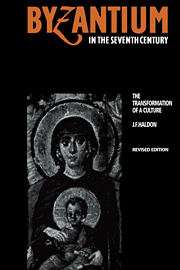Book contents
- Frontmatter
- Contents
- List of plates
- List of maps
- Preface and acknowledgements
- Preface to the revised edition
- List of abbreviations
- The sources
- Introduction
- 1 The background: state and society before Heraclius
- 2 The East Roman world c. 610–717: the politics of survival
- 3 Social relations and the economy: the cities and the land
- 4 Social relations and the economy: rural society
- 5 The state and its apparatus: fiscal administration
- 6 The state and its apparatus: military administration
- 7 Society, state and law
- 8 The imperial church and the politics of authority
- 9 Religion and belief
- 10 Forms of social and cultural organisation: infrastructures and hierarchies
- 11 Forms of representation: language, literature and the icon
- Conclusion: The transformation of a culture
- Addendum: Further observations on the question of the late ancient city
- Bibliography
- Index
8 - The imperial church and the politics of authority
Published online by Cambridge University Press: 13 November 2009
- Frontmatter
- Contents
- List of plates
- List of maps
- Preface and acknowledgements
- Preface to the revised edition
- List of abbreviations
- The sources
- Introduction
- 1 The background: state and society before Heraclius
- 2 The East Roman world c. 610–717: the politics of survival
- 3 Social relations and the economy: the cities and the land
- 4 Social relations and the economy: rural society
- 5 The state and its apparatus: fiscal administration
- 6 The state and its apparatus: military administration
- 7 Society, state and law
- 8 The imperial church and the politics of authority
- 9 Religion and belief
- 10 Forms of social and cultural organisation: infrastructures and hierarchies
- 11 Forms of representation: language, literature and the icon
- Conclusion: The transformation of a culture
- Addendum: Further observations on the question of the late ancient city
- Bibliography
- Index
Summary
THE CHURCH AS INSTITUTION
The Christian Church constituted one of the most powerful economic and ideological institutions of the late Roman world, a role it continued to play in the barbarian successor kingdoms and in the Byzantine empire throughout its history. While there is no doubt that Christianity was not universally accepted throughout the lands of the later Roman state – enclaves of traditional, local non-Christian beliefs may have survived well into the seventh and eighth centuries, for example – it was certainly by the early seventh century the majority faith, in which traditional beliefs were subsumed and through which older ways of seeing the world came to be expressed. In theory, it represented a universalist soteriological belief system, with a highly developed and sophisticated theological-philosophical arsenal at its disposal. In practice, while its formal debates, its day-today teachings, and the political theory implicit in it, were represented by its clergy and by the literate minority within society, as the single and correct form of belief, it included also a plurality of ways of intepreting the world inherited from the cultural traditions amongst which it grew up and matured and upon which it was eventually superimposed. This syncretism existed throughout the empire and throughout its history, although the form of its expression and where it was expressed varied greatly. And while the formal, sanctioned directions of belief expressed by members of the orthodox establishment at any given moment (and depending upon which form of ‘orthodoxy’ prevailed) tend to monopolise the theological and political debates of the time, the underlying tensions out of which they were refined must never be forgotten.
- Type
- Chapter
- Information
- Byzantium in the Seventh CenturyThe Transformation of a Culture, pp. 281 - 323Publisher: Cambridge University PressPrint publication year: 1990



